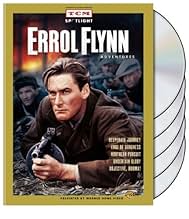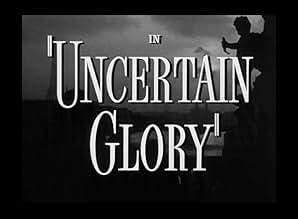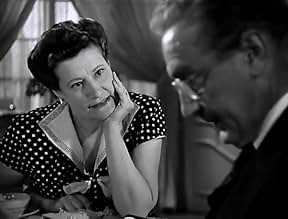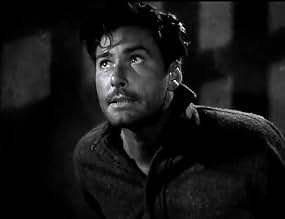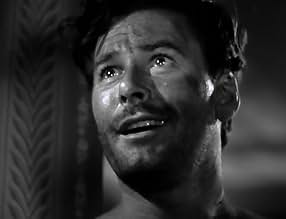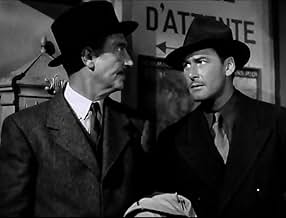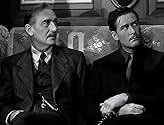IMDb रेटिंग
7.1/10
1.5 हज़ार
आपकी रेटिंग
अपनी भाषा में प्लॉट जोड़ेंAfter a career criminal is recaptured and knows he faces the guillotine, he offers to exchange his life for 100 hostages slated for execution by the Germans.After a career criminal is recaptured and knows he faces the guillotine, he offers to exchange his life for 100 hostages slated for execution by the Germans.After a career criminal is recaptured and knows he faces the guillotine, he offers to exchange his life for 100 hostages slated for execution by the Germans.
Douglass Dumbrille
- Police Commissioner LaFarge
- (as Douglas Dumbrille)
Felix Basch
- Gestapo Major
- (बिना क्रेडिट के)
Frederic Brunn
- German Soldier Reporting to Major
- (बिना क्रेडिट के)
Nora Bush
- Townswoman
- (बिना क्रेडिट के)
James Carlisle
- Townsman
- (बिना क्रेडिट के)
Wallis Clark
- Razeau
- (बिना क्रेडिट के)
Pedro de Cordoba
- Executioner
- (बिना क्रेडिट के)
Fred Cordova
- Execution Guard
- (बिना क्रेडिट के)
फ़ीचर्ड समीक्षाएं
Despite being quite a fan of Errol Flynn's, I had somehow managed to go forty years without seeing this movie, largely on the basis of its poor critical reputation. I always loved Flynn's swashbuckling, his insouciance, and especially his poignant performances near the end of his career in "The Sun Also Rises," "The Roots of Heaven," and "Too Much, Too Soon." I expected nothing from "Uncertain Glory," but a clip in a recent Flynn documentary caught my eye with what seemed to be a quite real and touching performance. I finally saw the film tonight and was impressed far beyond expectations. Flynn always harbored a hope of being respected as a dramatic actor, and though I think he achieved that in the previously mentioned later films, I was surprised to find in this 1944 performance a richness and texture every bit the equal of his best dramatic work. The film itself has, like most American movies of its period, certain conventions and unrealities which must be accepted (such as the variance in accents and some melodramatic plot devices), but it seemed to me to be quite believable and realistic within those confines. I was impressed by Paul Lukas, never a favorite of mine in particular, and the story kept me quite involved. Elements of it were quite moving. But Flynn quite simply overwhelmed my every expectation, and I suggest that this film might actually be reconsidered and included among the best pictures of his career. It's certainly one of his best performances.
Right after Flynn's rape trial Warner put him in "quickie" inexpensive films not knowing how the public would respond to Flynn films. Uncertain Glory was one of them. Most reviewers of the time panned the film as a minor Flynn vehicle and heroic Flynn nonsense. However, as time has passed some modern day reviewers have re-evaluted this film and some have commented that Flynn gives a really good performance in a pretty darn good cat and mouse drama. And I totally agree. The story is interesting and the interplay between Flynn and Oscar-winning(The Watch on the Rhine) Paul Lukas is terrific. I think this is maybe Flynn's most underrated film. Whenever I watch it I imagine by Flynn's character the ending could have gone quite different and been more unpredictable but knowing the times(1944) and still in the midst of WWII the ending had to be what it was... Patriotic. Again, I think "Uncertain Glory" is a very underrated Flynn movie. *** of **** rating...easy.
It was not until Marcel Ophul's 'Le Chagrin et la Pitié' that the myth of unified French resistance during the Nazi occupation was well and truly shattered. In this film from twenty-six years earlier France is likened to a nag who is 'too old to beef and too tough to die.'
This is a formulaic Warner Bros treatment but what a formula! Fluid editing and atmospheric cinematography from Warner stalwarts George Amy and Sidney Hickox with a dramatic score by Adolph Deutsch.
Warners had taken a chance on the unknown Errol Flynn as Captain Blood in 1935 and in Jack Warner's words: "we knew that we had grasped the brass ring in our thousand to-one shot spin." This is the fifth of seven films starring Flynn and directed by Raoul Walsh and as Flynn is the uncredited executive producer for his own short-lived Thomson Company one assumes he had a say in the casting.
Paul Lukas seems the obvious choice following his stunning performance in 'Watch on the Rhine' and it is the dynamic between his Inspector Bonet and Flynn's criminal Picard/Lafont that makes the film work. There is the customary mish mash of accents of course and Hollywood's inevitable 'God' element is here represented by the charismatic priest of Dennis Hoey. The formidable Lucille Watson never disappoints and there is a lovely performance by the enchanting newcomer Jean Sullivan who soon gave it up to concentrate on her first love, dance.
Throughout its forty-year existence Warners had some trash but it was seldom boring or pretentious and this entertaining film, although certainly not a 'classic', is no exception.
This is a formulaic Warner Bros treatment but what a formula! Fluid editing and atmospheric cinematography from Warner stalwarts George Amy and Sidney Hickox with a dramatic score by Adolph Deutsch.
Warners had taken a chance on the unknown Errol Flynn as Captain Blood in 1935 and in Jack Warner's words: "we knew that we had grasped the brass ring in our thousand to-one shot spin." This is the fifth of seven films starring Flynn and directed by Raoul Walsh and as Flynn is the uncredited executive producer for his own short-lived Thomson Company one assumes he had a say in the casting.
Paul Lukas seems the obvious choice following his stunning performance in 'Watch on the Rhine' and it is the dynamic between his Inspector Bonet and Flynn's criminal Picard/Lafont that makes the film work. There is the customary mish mash of accents of course and Hollywood's inevitable 'God' element is here represented by the charismatic priest of Dennis Hoey. The formidable Lucille Watson never disappoints and there is a lovely performance by the enchanting newcomer Jean Sullivan who soon gave it up to concentrate on her first love, dance.
Throughout its forty-year existence Warners had some trash but it was seldom boring or pretentious and this entertaining film, although certainly not a 'classic', is no exception.
Errol Flynn is headed for "Uncertain Glory" in this 1944 film also starring Paul Lukas, Faye Emerson, Lucille Watson, Sheldon Leonard, and Jean Sullivan. The premise is similar to 1943's "Hangmen Also Die!" in one way - the Nazis have taken hostages who will die unless a saboteur is found. In this case, it's the saboteur who blew up a French bridge and killed Germans. Nazis have taken many men as hostages from a small nearby village. Parallel to this, an Inspector Bonet (Lukas) has finally tracked down a fugitive convicted of murder, Jean Picard (Flynn) who has slipped through France's fingers time and time again - the last time, just as he was about to get the guillotine, the site was bombed, and he escaped. A friend (Leonard) puts Bonet on his trail, and he's eventually caught. En route to another bout with the guillotine, Picard suggests that he'd rather die by firing squad - can't the Inspector say he is the saboteur, save the 100 men, and Picard can still meet his death? After some thought, Bonet agrees. Giving out a report of Picard's death, the name Dupont is given to Picard, someone on whom the Nazis cannot check. The real saboteur, whom they help escape, gives them the critical details - one especially important one - to tell the Nazis.
Raoul Walsh directed this film, which is sluggish at times and obviously just cranked out by Warners - probably one of those ones where Jack Warner whined to Walsh, you have to direct this movie for me. Walsh: Who's in it? Warner: Oh, I don't know. Just do it. According to Walsh, this type of thing went on all the time. It's actually a good story that with a little more in the way of production values could have been excellent.
Paul Lukas is wonderful as a gruff, honest inspector whose patriotism overcomes his honesty and who has bonded with this criminal in spite of himself even though he doesn't trust him and doesn't like him. Flynn does very well in his part - despite Jean's earnest sincerity, you know he wants nothing more than to get away from Bonet as soon as possible, and this whole thing is an elaborate ploy. But he has Bonet half-believing him. Lucille Watson plays a tough woman whose son is one of the hostages and who goes against the village priest to frame someone as the saboteur so her son can be freed.
One of the comments on this site complained about the French people speaking English. I repeat the theatrical rule: when citizens of a country are depicted in their country in a film or play, they would be speaking their own language, not English with a French accent. Therefore, no accent is necessary, Lucille Watson in this movie being the purest example of this. Flynn and Lucas have accents, of course - one just has to pretend they came from different parts of France.
All in all, the two stars make the film worthwhile.
Raoul Walsh directed this film, which is sluggish at times and obviously just cranked out by Warners - probably one of those ones where Jack Warner whined to Walsh, you have to direct this movie for me. Walsh: Who's in it? Warner: Oh, I don't know. Just do it. According to Walsh, this type of thing went on all the time. It's actually a good story that with a little more in the way of production values could have been excellent.
Paul Lukas is wonderful as a gruff, honest inspector whose patriotism overcomes his honesty and who has bonded with this criminal in spite of himself even though he doesn't trust him and doesn't like him. Flynn does very well in his part - despite Jean's earnest sincerity, you know he wants nothing more than to get away from Bonet as soon as possible, and this whole thing is an elaborate ploy. But he has Bonet half-believing him. Lucille Watson plays a tough woman whose son is one of the hostages and who goes against the village priest to frame someone as the saboteur so her son can be freed.
One of the comments on this site complained about the French people speaking English. I repeat the theatrical rule: when citizens of a country are depicted in their country in a film or play, they would be speaking their own language, not English with a French accent. Therefore, no accent is necessary, Lucille Watson in this movie being the purest example of this. Flynn and Lucas have accents, of course - one just has to pretend they came from different parts of France.
All in all, the two stars make the film worthwhile.
Uncertain Glory (1944)
A rather good war drama, a bit pre-packaged but very well done, as pretty much all Warner Bros films were from this era. Errol Flynn was at a point in his career when he wanted to become a "leading man" in the broader sense, not just a sword-fighting (and handsome) daredevil.
Key to the movie is the quasi-propaganda quality of the movie, set and made during World War II. That's not a bad thing—it's not government propaganda at all, but simply rooting for the good guys, and putting the French (our allies) in a good light (which they deserve).
The plot twist is simple and comes out early, so this gives nothing away—Flynn is a petty criminal who killed someone in a moment of panic, almost by accident, and he's about to have his head chopped off. But then an opportunity (dramatically and beautifully done) suggests a different way to die: for the Cause. The question is whether he can follow through, or whether he'll follow his new romantic (and idealized) love interest to a free new life.
It's all rather good even if contained in movie expectations. The police detective who is guarding and helping Flynn's character is a stalwart of the period, Paul Lukas, and he adds a needed level of gravity and even complexity to the interactions. Flynn is a cheerful presence—very American (even though he's from Tasmania!)—but he often responds rather than leads his scenes. The third lead is the woman, played with wonderful honesty by Faye Emerson.
Part of enjoying these WWII movies is knowing their context, and getting how the audience was wild for a sense of the war, of knowing who was winning, and of sensing how the scene worked, what the French were really like, what the chances were for a soldier caught up in it all. Their brother, their son. And that's kind of what this movie is about, showing heroism, and goodness, and how the war is a just cause and the Nazis are truly horrible (they were). Flynn does what he needs to do here, and if there is artifice and some lack of total believability, that's almost necessary so that a safe distance and cushion is in place.
Not an essential movie, but a really good one, especially if you already like this kind of film and this era.
A rather good war drama, a bit pre-packaged but very well done, as pretty much all Warner Bros films were from this era. Errol Flynn was at a point in his career when he wanted to become a "leading man" in the broader sense, not just a sword-fighting (and handsome) daredevil.
Key to the movie is the quasi-propaganda quality of the movie, set and made during World War II. That's not a bad thing—it's not government propaganda at all, but simply rooting for the good guys, and putting the French (our allies) in a good light (which they deserve).
The plot twist is simple and comes out early, so this gives nothing away—Flynn is a petty criminal who killed someone in a moment of panic, almost by accident, and he's about to have his head chopped off. But then an opportunity (dramatically and beautifully done) suggests a different way to die: for the Cause. The question is whether he can follow through, or whether he'll follow his new romantic (and idealized) love interest to a free new life.
It's all rather good even if contained in movie expectations. The police detective who is guarding and helping Flynn's character is a stalwart of the period, Paul Lukas, and he adds a needed level of gravity and even complexity to the interactions. Flynn is a cheerful presence—very American (even though he's from Tasmania!)—but he often responds rather than leads his scenes. The third lead is the woman, played with wonderful honesty by Faye Emerson.
Part of enjoying these WWII movies is knowing their context, and getting how the audience was wild for a sense of the war, of knowing who was winning, and of sensing how the scene worked, what the French were really like, what the chances were for a soldier caught up in it all. Their brother, their son. And that's kind of what this movie is about, showing heroism, and goodness, and how the war is a just cause and the Nazis are truly horrible (they were). Flynn does what he needs to do here, and if there is artifice and some lack of total believability, that's almost necessary so that a safe distance and cushion is in place.
Not an essential movie, but a really good one, especially if you already like this kind of film and this era.
क्या आपको पता है
- ट्रिवियाErrol Flynn was criticized for playing heroes in World War II movies. Tony Thomas in his book 'Errol Flynn: The Spy Who Never Was' states that Flynn had tried to enlist in every branch of any armed services he could but was rejected as unfit for service on the grounds of his health. He had a heart condition, tuberculosis, malaria and a back problem. Flynn felt he could contribute to America's war effort by appearing in such films as Edge of Darkness (1943); Northern Pursuit (1943); Dive Bomber (1941), Objective, Burma! (1945) and Uncertain Glory (1944). Reportedly, Flynn was at his most professional and co-operative he ever was whilst working on Second World War movies. The studios apparently did not diffuse the criticism of Flynn's state-of-health as they wished to keep it quiet for fear of his box-office draw waning.
- गूफ़About 1:20 into the film, there is a scene where the French police are coming into the town at night. One, on a motorcycle, rounding a corner, seemingly slips on the wet cobblestones and crashes in front of the camera - the shadow of his head flashes across the bottom of the screen and the sound of his presumed crash can be heard.
- भाव
Jean Picard: [indignantly to the barber just before he is to be sent to face the guillotine] My head comes off as it is!
- कनेक्शनFeatured in The Adventures of Errol Flynn (2005)
- साउंडट्रैकLa Marseillaise
(1792) (uncredited)
Music by Claude Joseph Rouget de Lisle
Variations in the score often
टॉप पसंद
रेटिंग देने के लिए साइन-इन करें और वैयक्तिकृत सुझावों के लिए वॉचलिस्ट करें
- How long is Uncertain Glory?Alexa द्वारा संचालित
विवरण
- चलने की अवधि1 घंटा 42 मिनट
- रंग
- पक्ष अनुपात
- 1.37 : 1
इस पेज में योगदान दें
किसी बदलाव का सुझाव दें या अनुपलब्ध कॉन्टेंट जोड़ें



